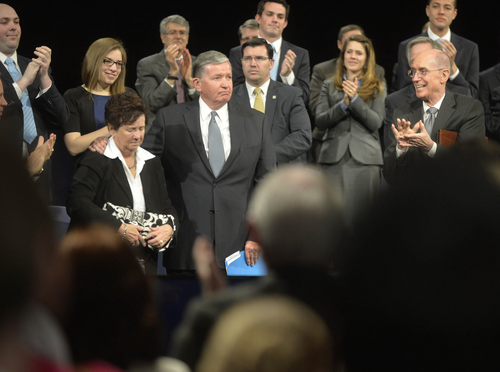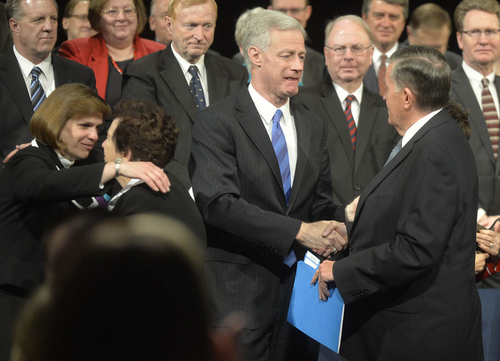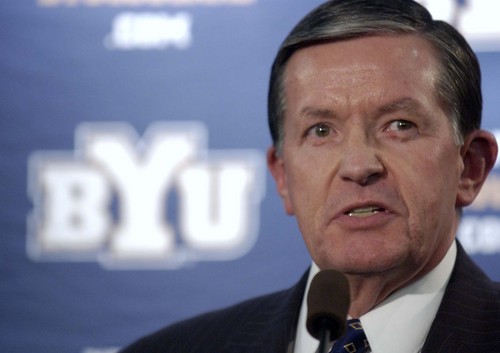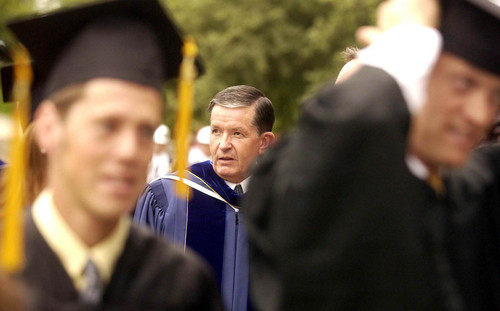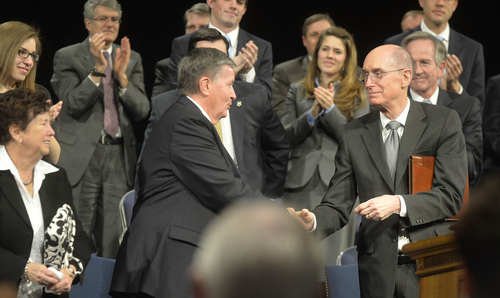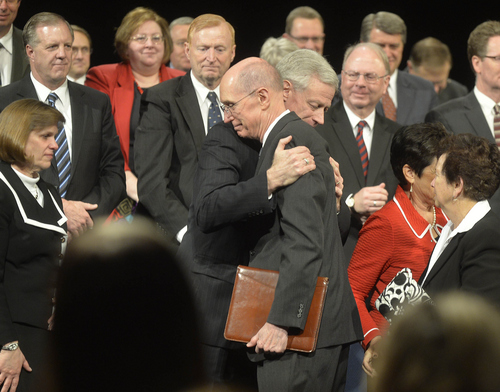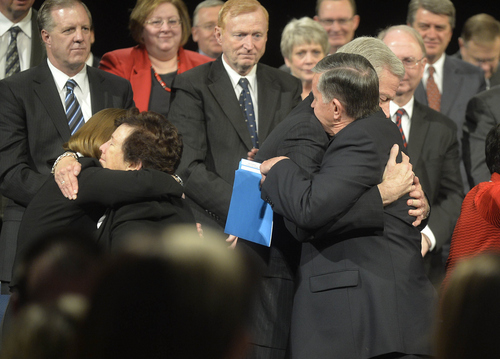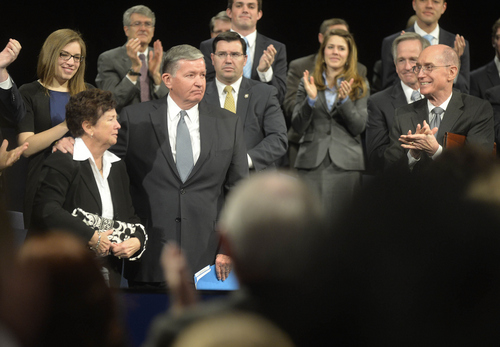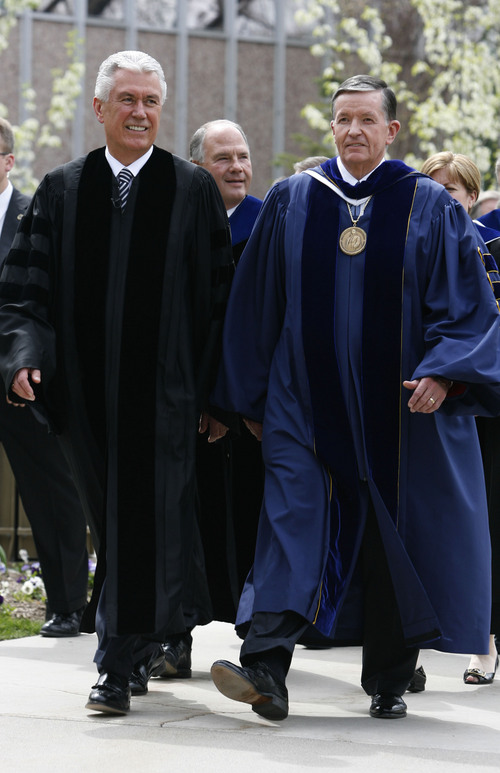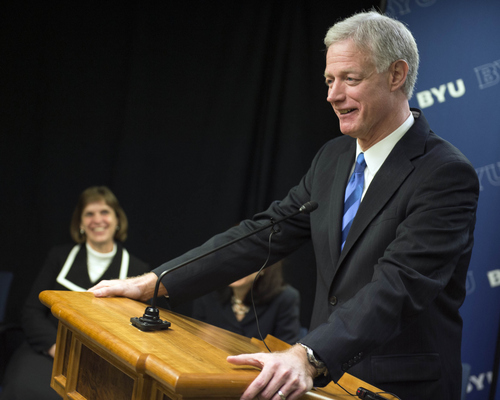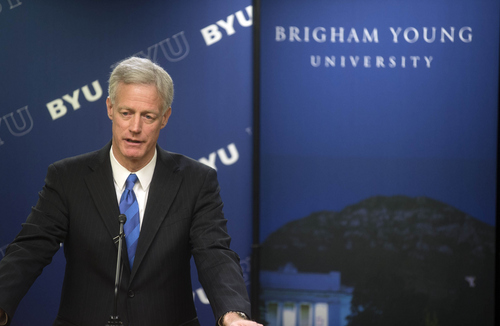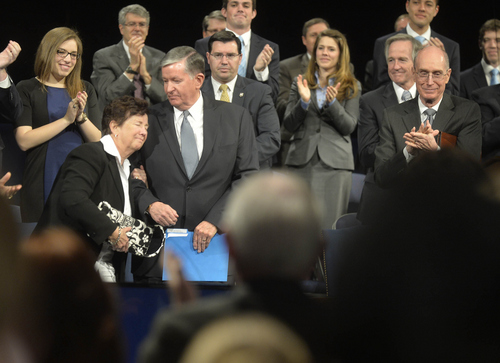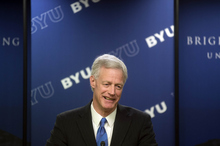This is an archived article that was published on sltrib.com in 2014, and information in the article may be outdated. It is provided only for personal research purposes and may not be reprinted.
Brigham Young University has named Kevin J. Worthen, who has worked in the mines of Carbon County and as the dean of its law school, as the school's 13th president.
Worthen, now serving as BYU's vice president of advancement, will replace current president Cecil O. Samuelson, 72, on May 1.
"I am both honored and humbled, as you might imagine, at this opportunity to serve at the university. It's a place I love," said Worthen, 57, on Tuesday. "I don't consider myself measuring up to those who preceded me in this, but I take comfort in the fact that this decision was made by those who I have great confidence in."
Worthen said he doesn't "anticipate any radical changes" under his leadership, noting that the mission of the university, owned by The Church of Jesus Christ of Latter-day Saints, remains the same.
"It's really a question of how do we better achieve that mission," Worthen said. However, he added, "At the same time, I find no one is really given this kind of assignment to maintain the status quo."
—
Challenges ahead • BYU had about 33,300 students in 2012, though the size of the student body dropped about 10 percent in 2013 due to lowered age requirements for LDS missionaries. The age at which men are allowed to serve was lowered to 18 from 19, and the age for women was lowered to 19 from 21.
Worthen said the university has left room for those missionaries when they return. He also said one challenge will be providing housing, since returned missionaries may want different options.
"Not everybody takes their freshman year all that seriously before their mission," Worthen said. "My guess is these young men coming back will be more seriously involved in the academic process than a typical 18-year-old would have been."
Henry B. Eyring of the church's First Presidency and vice chairman of the Board of Trustees made the announcement to students gathered for the school's morning devotional at the Marriott Center on Tuesday.
Junior Sam Shields said he's excited to see Worthen take the helm. Worthen was the stake president in Shields' young single adults ward, he said.
"I really like President Worthen. He's a great man and he really connects well with young single adults," Shields said.
"It's kind of sad to see President Samuelson go, but things have to change, and they do change," said Emilia Williams, a BYU senior.
"I didn't totally see it coming," said Kyle Condie, a BYU junior, of Samuelson's departure, "but it seems like he's been there a while, and I'm excited to see what the new president will do."
—
Roots in Utah, global interests • Worthen is from Carbon County and earned an associate degree from the College of Eastern Utah (now Utah State University Eastern), where he was co-captain of the varsity basketball team and worked as a coal miner during the summers.
He went on to earn a bachelor's degree and a law degree from BYU.
Worthen served a U.S. Supreme Court clerkship in 1983 and 1984 for Justice Byron White, where he further developed his interest in American Indian law. He became a noted scholar on the subject, as well as the law's impact on indigenous peoples worldwide.
Worthen served a mission for the LDS Church in Monterrey, Mexico, and speaks Spanish. He was a Fulbright Scholar in Chile in 1994.
He worked as an attorney in Phoenix before joining the BYU faculty as an associate professor in 1987.
Worthen was named dean of the J. Reuben Clark Law School in 2004 — the first alum to serve as dean — and stayed there for four years before becoming vice president of advancement.
He is currently serving as an Area Seventy for the LDS Church. He and his wife, Peggy Sealey Worthen, have three children and one grandchild.
Peggy Sealey Worthen said during a press briefing that she's glad to be there for her husband in his new role.
"I don't think growing up as a non-LDS person here in Utah," Worthen joked, "she envisioned at some point she'd be in the position she's in now."
—
Samuelson's leadership • Before Samuelson was elevated to president in 2003, he also served as a dean, though he led of the University of Utah's School of Medicine. He was also as a senior vice president for Intermountain Health Care.
Samuelson was called to serve as a member of the First Quorum of the Seventy of the LDS Church in 1994, and was granted General Authority emeritus status in 2011.
"President Samuelson has served this institution with great distinction and it is important for the faculty, staff, students and supporters of this university to know that the First Presidency, Quorum of 12 and Board of Education unanimously recognize the great work and devotion of President Cecil O. Samuelson to this university," Eyring said. "Truly his leadership and influence for good cannot be measured."
Carri Jenkins, a spokeswoman for BYU, said the church's decision to replace Samuelson was not based on any dissatisfaction. She said, simply, "His service is complete."
She noted that most of his predecessors served for about nine or 10 years — a length Samuelson has already surpassed. —
Tuition at Brigham Young University
2012-13 $2,355 $4,710
2013-14 $2,425 $4,850
2014-15 $2,500 $5,000


